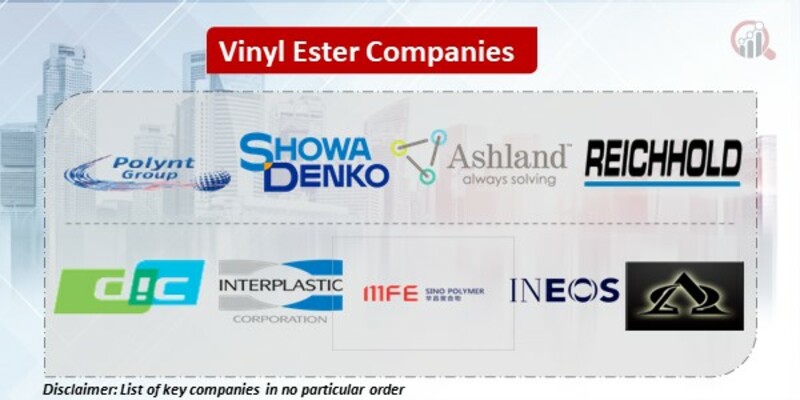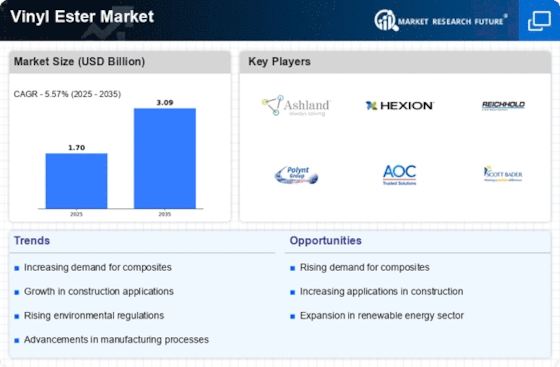Top Industry Leaders in the Vinyl Ester Market
 The vinyl ester market, though less turbulent than the open seas it serves, still churns with fierce competition and constant innovation. These versatile resins, boasting superior corrosion resistance and high strength, find their anchor in diverse applications like pipes and tanks, marine vessels, wind turbine blades, and chemical processing equipment. Understanding the currents driving this market requires a deep dive into the key players, their strategies, and the factors influencing market share.
The vinyl ester market, though less turbulent than the open seas it serves, still churns with fierce competition and constant innovation. These versatile resins, boasting superior corrosion resistance and high strength, find their anchor in diverse applications like pipes and tanks, marine vessels, wind turbine blades, and chemical processing equipment. Understanding the currents driving this market requires a deep dive into the key players, their strategies, and the factors influencing market share.
Market Captains and their Navigation Tactics:
-
Polynt Composites: This Italian champion holds the helm with its extensive global reach and diverse product portfolio catering to various industries. Their focus on quality and technical support solidifies their position as a leading supplier. -
INEOS Composites: This UK titan offers a robust lineup of vinyl ester resins under the Derakane* brand, focusing on high-performance applications in wind energy and marine sectors. Their emphasis on research and development helps them chart new courses. -
DIC Corporation: This Japanese powerhouse sails with its Neovinyl* brand, targeting specialty applications like chemical storage and tank linings. Their commitment to innovative solutions and sustainability resonates with eco-conscious buyers. -
Interplastic Corporation: This US-based player navigates the market with its Interbond* and Hetron* brands, specializing in custom-formulated resins for niche applications. Their agility and customer focus keep them afloat in competitive waters. -
SHOWA DENKO K.K.: This Japanese competitor steers with its Setalon* brand, focusing on high-purity vinyl ester resins for demanding applications like semiconductor fabrication and medical devices. Their dedication to precision and quality distinguishes them in the market.
Charting the Course: Factors Influencing Market Share:
Beyond brand recognition, several factors dictate the market share distribution in the vinyl ester market:
-
Technological Advancements: Developing novel vinyl ester formulations with improved properties like fire retardancy, biodegradability, or faster curing times opens doors to new applications and attracts new customers. Recent examples include Polynt's flame-retardant vinyl ester for building materials and INEOS' low-VOC resin for boat construction. -
Regional Growth: Asia Pacific emerges as the rising tide, driven by rapid infrastructure development and industrial expansion. Polynt and DIC Corporation are strategically expanding their presence in this region to ride the wave. -
Sustainability Concerns: The growing emphasis on eco-friendly solutions pushes manufacturers towards bio-based or readily recyclable vinyl esters. DIC Corporation's bio-based resin initiative and Interplastic's focus on recyclable formulations exemplify this trend. -
Vertical Integration: Integrating backward to secure raw materials or forward into downstream applications can offer cost advantages and market control. Polynt's control over key raw materials like bisphenol A gives them a significant edge.
Key Companies in the Vinyl Ester market include
- AO LLC
- Ashland holdings Inc
- DIC Corporation
- INEOS
- Inter plastic corporation
- Polynt
- Reinchhold LLC 2
- SHOWA DENKO K.K
- Sino Polymer Co. Ltd
Recent Developments:
-
September 2023: Regional expansion continues with INEOS' new production facility in India and SHOWA DENKO K.K.'s strategic partnership with a distributor in Latin America. -
October 2023: Innovation takes center stage with SHOWA DENKO K.K.'s development of a high-purity vinyl ester for medical implants and Polynt's launch of a self-healing vinyl ester for marine coatings. -
November 2023: Regulatory concerns emerge with stricter environmental regulations in Europe impacting raw material sourcing for some players. -
December 2023: Industry collaboration flourishes with the formation of a consortium to develop standardized testing methods for vinyl ester resins.











